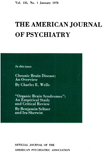A review of major implications of the O'Connor v. Donaldson decision
Abstract
Although the Supreme Court's decision in O'Connor v. Donaldson is narrow from the legal perspective, it will have wide clinical applications for psychiatry if it reflects a trend in future court decisions. The author assesses the impact of this decision on the mental health profession in terms of the issue of dangerousness as grounds for involuntary commitment for psychiatric treatment, the principle of least restrictive alternative to hospitalization, the question of adequacy of treatment in light of the absence of nationally defined standards, and the personal liability of physicians for their professional actions.
Access content
To read the fulltext, please use one of the options below to sign in or purchase access.- Personal login
- Institutional Login
- Sign in via OpenAthens
- Register for access
-
Please login/register if you wish to pair your device and check access availability.
Not a subscriber?
PsychiatryOnline subscription options offer access to the DSM-5 library, books, journals, CME, and patient resources. This all-in-one virtual library provides psychiatrists and mental health professionals with key resources for diagnosis, treatment, research, and professional development.
Need more help? PsychiatryOnline Customer Service may be reached by emailing [email protected] or by calling 800-368-5777 (in the U.S.) or 703-907-7322 (outside the U.S.).



